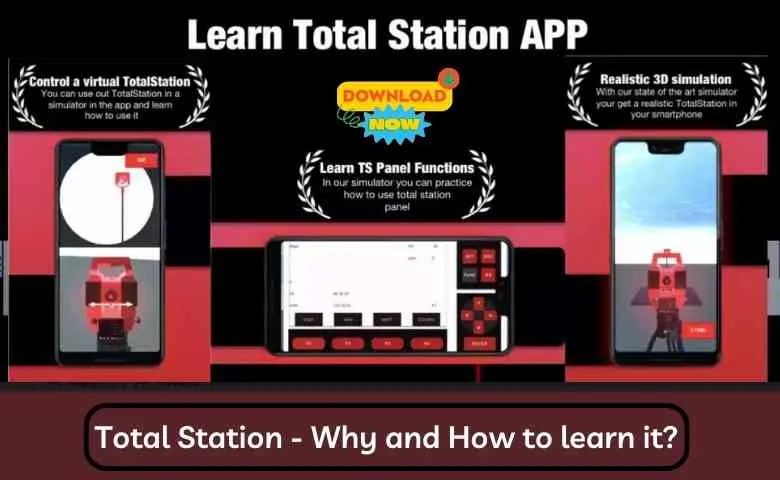Last Updated on April 1, 2023 by Admin
Are you interested in the field of land surveying or construction? Do you want to improve your skills and knowledge in the industry? Then you might want to consider learning about total stations. A total station is an electronic surveying instrument that can measure distances, angles, and coordinates with high accuracy. In this post, we’ll explore the reasons why total stations are important in the industry, and we’ll provide some tips on how to learn about this useful tool. Whether you’re a student, a professional, or just curious about the field, read on to find out more about total stations and how they can benefit you.
Table of Contents
Why should you learn Total Station?
Total Station is the most important surveying instrument to learn for anyone looking to work as a site engineer. Everyone wants to learn Total Station, but the biggest issue preventing students from learning it is the unavailability of one.
Total Station Tutor is a simulator app that provides a comprehensive toolset to learn total station operations. It is designed for both iOS and Android users and enables users to practice their total station skills on their smartphones.
This app is unique in that it addresses one of the most significant challenges in learning total station operations, which is the limited availability of total stations.
With Total Station Tutor, users can learn and improve their total station skills anytime, anywhere, without needing an actual total station instrument.
If you want to learn about Total Station, We highly recommend you download Total Station Tutor App.
Apple AppStore Link: Click here to download
Google Play Store Link: Click here to download
Functions of Total Station Tutor App
Total Station Tutor offers five basic and important functions: TILT, Station Orientation, Resection, Observation, and Setting Out. These functions are essential for operating a total station, and the app provides a simulated environment to practice and learn each function.
The app offers clear and concise instructions that are easy to understand, making it ideal for beginners and advanced users.
Related Posts:
- Top 15 Books for Beginners Job Seekers To Read In 2023
- Top Job Search Apps to Find Your Dream Job in 2023
- 20 Best Civil Engineering Apps For Every Construction Professional
- 16 Best Electrical Engineering Apps For Every Electrical Engineer
- Top Job Search Apps to Find Your Dream Job in 2023
Learning the Parts of a Total Station
Total Station Tutor also offers an opportunity to learn about different total station parts. Understanding the individual components of a total station can be beneficial in learning how to operate the instrument effectively.
This feature enables users to identify the various parts of the total station and learn their functions. Users can also learn how these parts work together to make precise measurements.
Advantages of Total Station Tutor App
One of the key advantages of the Total Station Tutor app is its accessibility. Students and surveyors can practice and learn total station skills without needing an actual total station instrument.
With Total Station Tutor, learning total station operations is no longer limited by the availability of total stations. The app also enables users to learn at their own pace, without the pressure of having to keep up with other students or a strict timetable.
Another advantage of the app is its user-friendly interface. The app is designed to be intuitive and easy to use, making it ideal for both beginners and advanced users. The clear and concise instructions help to ensure that users can quickly understand and apply the concepts being taught.
The app also provides users with feedback on their progress, highlighting areas where they may need to improve and offering tips and advice for increasing accuracy. This feature helps to ensure that users can continually improve their skills and make the most of the app.
Conclusion
In conclusion, Total Station Tutor is a comprehensive simulator app that provides an ideal toolset to learn total station operations. It is accessible, intuitive, and easy to use, making it an excellent choice for both beginners and advanced users.
With the app’s simulated environment and clear instructions, users can learn and practice total station operations at their own pace, without needing an actual total station instrument. Additionally, the app offers feedback to users, enabling them to continually improve their skills and make the most of the app. Overall, the Total Station Tutor app is a valuable resource for surveyors and students looking to learn or improve their total station skills.
Overall, the Total Station Tutor app is a valuable resource for anyone who needs to use a total station for surveying and measuring on a construction site. Its user-friendly interface, comprehensive tutorials, and interactive quizzes make it an excellent tool for both beginners and experienced professionals.
Again If you want to learn Total Station, I highly recommend you download Total Station Tutor App
Apple AppStore Link: Click here to download
Google Play Store Link: Click here to download
FAQs
A total station is used in land surveying and construction to measure distances, angles, and coordinates with high accuracy. It is an essential tool for creating precise plans and designs.
The four types of total stations are manual total stations, robotic total stations, reflectorless total stations, and motorized total stations.
The principle of a total station is based on the combination of electronic distance measurement (EDM) and angular measurements. It uses infrared light or electromagnetic waves to measure the distance to a target and an electronic angle-measuring system to measure the angles between the target and the instrument.
A total station and EDM (Electronic Distance Measurement) are both components of a surveying instrument. The total station measures angles and distances, while the EDM component measures the distance between the instrument and a specific target. The two components work together to provide highly accurate measurements in land surveying and construction projects.


